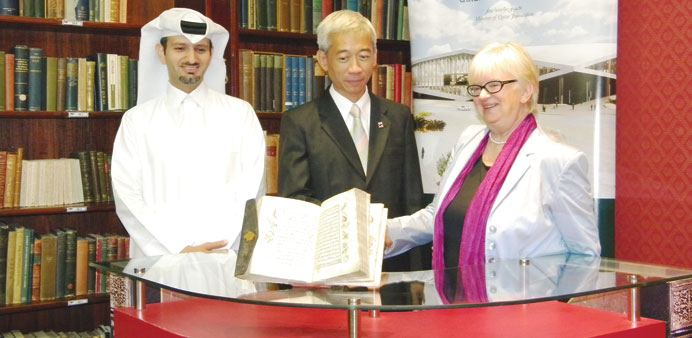By Joey Aguilar/Staff Reporter
The Thai embassy in Doha donated a 198-year-old copy of the Holy Qur’an to Qatar National Library (QNL) yesterday at the Heritage Collection Building in a bid to promote cultural relations with Qatar.
Previously owned by Ustaz Yusuf bin Harun from Pattani, a province in Thailand, the Quran was handwritten by Al Sheik Al Khatib Hud bin Mahmoud, who also lived in the same place.
It took Mahmoud five years to finish the Qur’an, which was completed in 1236 of the Islamic Hijrah calendar during his Haj pilgrimage trip to Makkah, Saudi Arabia.
Thai Ambassador Panyarak Poolthup handed over the holy book to Dr Claudia Lux, project director of QNL.
In an interview, Poolthup told Gulf Times that they wanted to build what he described as a “solid cultural relationship” with the people of Qatar, citing that 10% of Thailand’s population are Muslims.
It could be recalled that Thai Princess Maha Chakri Sirindhorn had visited Doha, particularly the Heritage library, in January 2012 and was shown some of the ancient copies of the Qur’an.
“Her Royal Highness then deemed it appropriate to link the past to the present by donating a historical Qu’ran to the vast collection,” said Poolthup.
“I asked Ustaz if there is any ancient Qur’an in Thailand and he said he has seen some. After a month, he told me that he can get a copy, and here it is right now,” said the ambassador, who had a meeting with the owner of the book three months ago.
Meanwhile, Lux thanked the embassy for donating a special and rare Qur’an, beautifully designed in gold and red and “a very special expression of art”.
As part of the library’s most important and rare books, QNL’s latest collection is expected to be exhibited in the future. Families, students, researchers and tourists will be given the chance to read and explore the book that will stay inside the Heritage Collection Building.
Thousands of books, including those on Arab and Islamic heritage, Arab law and children and teenagers’ collections are also housed in the same building. “I think we have to learn a lot from Thailand about what they have already done and how they have developed their heritage,” said Lux.
Besides having a growing number of valuable, rare and historical materials, it is learnt that the library has recently finished digitalising about 3,000 books and manuscripts.
Only a few can be viewed on QNL’s website (www.qnl.qa) - mostly books which the library had submitted to the World Digital Library.
Lux hoped that the 3,000 digitalised books and manuscripts could all be viewed in the next three months once their portal was done. “You can then take a look at it more closely and will be able to see what beautiful objects we have,” she said.
In a press statement, QNL said its collection of over 100,000 works contains an edition of Ptolemy’s Geographia, which was printed in Rome in 1478. It is considered the oldest printed map showing the name of Qatar referred to in Latin as “Catara”.
“It is an unparalleled showcase of historical sources about Qatar and the Arab world and includes writings by travellers and explorers who visited the Arabian Gulf region,” it said.
QNL also announced that the Heritage Collection Building is open for public tours during Sundays and Tuesdays from 10am to 11.30am.
It added that residents with valid Qatari ID/residence permit are eligible for free library registration. They will be given free online access to numerous collections such as latest bestsellers, classical works, concerts, top academic journals and documentaries.
Library members can now get a list of online books at http://www.qnl.qa/find-answers/online-resources

Thai Ambassador Panyarak Poolthup hands over the 198-year-old Holy Qur’an to QNL project director Claudia Lux. PICTURE: Joey Aguilar
